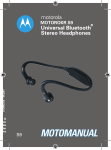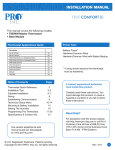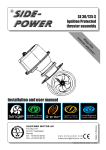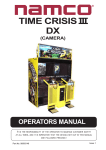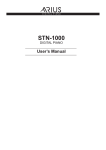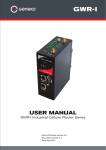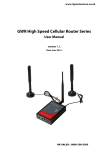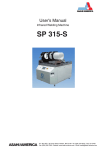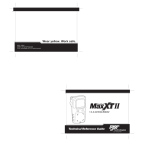Download Bosch TSTBM3H2CPH6W-A Installation manual
Transcript
Thermostat Installation Manual Series tTSTBM3H2CPH6W-A thermostat and Wireless Communicating Base Module TSTBM3H2CPH6W-A 6 720 220 376 Revised 02-13 of Contents 2Table TSTBM3H2CPH6W-A Table of Contents Thermostat Applications Guide.............................................................................. 3 Power Type............................................................................................................. 3 Thermostat Quick Reference.................................................................................. 3 Installation Tips...................................................................................................... 4 Removing the Private Label Badge......................................................................... 4 Wall locations......................................................................................................... 4 Base Module—Basement Installation...................................................................... 5 Base Module—Attic Installation .............................................................................. 5 Wiring..................................................................................................................... 5 Base Module Subbase Installation......................................................................... 5 Thermostat Installation and wiring......................................................................... 6 Battery Installation................................................................................................. 6 Mount Thermostat and Base Module...................................................................... 7 Wiring Schematicss................................................................................................ 8 Terminal Designations on Base Module................................................................ 12 Terminal Designations on TSTBM3H2CPH6W-A Master Thermostat.................... 12 Powering the TSTBM3H2CPH6W-A Master Thermostat....................................... 12 Establishing Communication between TSTBM3H2CPH6W-A Master Thermostat and the Base Module............................................................. 13 Using Multiple TSTBM3H2CPH6W-A wireless thermostats.................................. 13 Technician Setup Menu........................................................................................ 14 Understanding Swing And Staging ...................................................................... 22 HUM Terminal....................................................................................................... 22 DHM Terminal....................................................................................................... 22 Humidification / Dehumidification Recommendation for Bosch Heat Pump ....... 23 Setting Target Humidity Setpoint......................................................................... 23 Ambient Humidity Display.................................................................................... 23 Recommended Cooling Settings:......................................................................... 24 Set Time............................................................................................................... 24 Programming........................................................................................................ 24 Specifications ...................................................................................................... 27 Troubleshooting ................................................................................................... 27 Contact your local Bosch Dealer........................................................................... 28 Limited Warranty.................................................................................................. 29 Caution Warning: If you are setting up this thermostat for an AC unit with electric heat, or gas furnace, it is imperative that the the “FAN OPERATION” menu feature is set to ELE or GAS, which ever applies. The default setting is GAS; if electric heat strips are installed and the default value of GAS is used, it is possible that the electric heat strips can become energized without the blower motor on when there is a call for heat. Reference the Tech Menu Setup section on how to change this feature. 6 720 220 376 Subject to change without prior notice Revised 02-13 TSTBM3H2CPH6W-A Thermostat Quick Reference The TSTBM3H2CPH6W-A offers the following: • 3 stages of heating 3 THERMOSTAT QUICK REFERENCE Getting to know your thermostat • 2 stages of cooling 2 • Temperature averaging with remote sensors • Wireless control 5 • 5+1+1 & 7 Day Programmable 1 Thermostat Applications Guide Description Gas or Oil Heat Yes Electric Furnace Yes Heat Pump (No Aux. or Emergency Heat) Yes Heat Pump (with Aux. or Emergency Heat) Yes Multi-stage Systems Yes Heat Only Systems Yes Cool Only Systems Yes Dual Fuel Systems Yes Millivolt No Humidity Yes Auto Change Over Yes 7 6 3 1.LCD Display 2. Glow in the Dark Light Button* 3.Fan Button 4. System Button 5. Temperature Setpoint Buttons Power Type 6. Menu Button • Battery Power* • Hardwire (Common Wire) 7. Humidity Button • Hardwire (Common Wire) with Battery Backup Caution * If using remote sensors the thermostat must be hardwired. A trained, experienced technician must install this product. Carefully read these instructions. You could damage this product or cause a hazardous condition if you fail to follow these instructions. Caution This thermostat is shipped from the factory to operate a conventional heating and cooling system. This thermostat will also operate a heat pump system. See the “heat pump” confi guration step in the Tech Menu setup of this manual to configure the thermostat for heat pump applications. Revised 02-13 4 Subject to change without prior notice NOTE ABOUT THE LIGHT BUTTON: This button is used to light up the display, but it is also used to set up communication with the base module. DO NOT hold the light button down for more then 10 seconds, unless you are performing the initial communication setup steps. The low battery indicator is displayed when the AA battery power is low. If the user fails to replace the battery within 21 days, the thermostat display will only show the low battery indicator as a final warning before the thermostat becomes inoperable. The batteries are located on the back of the thermostat. 6 720 220 376 4Installation TSTBM3H2CPH6W-A Tips Days of the week and time. Flashes ambient humidity level. May also flash outside temperature when used with TSTBM-OTS--TW-A. OUTDOOR will show. Programmable Time Period Icons: This thermostat has 4 programmable time periods per day. HOLD is displayed when thermostat program is permanently overridden. Displays the user selectable setpoint temperature. System operation indicators: Temperature: Indicates the current system temperature. COOL HEAT FAN The COOL, HEAT or FAN icon will display when the COOL, HEAT or FAN is on. Humidity: Shows the humidity target setpoint settings and keys. Clean Display: Pressing CLEAN DISPLAY will allow 30 seconds to clean the display. The keys will be inoperable during this time. CLEAN will appear if your contractor has programmed a filter change reminder. Press CLEAN when filter has been replaced to reset the filter 2 change reminder timer. REMOTE indicates a remote has control of the system. NOTE: The compressor delay feature is active if these icons are flashing. The compressor will not turn on until the 5 minute delay has elapsed. Additional Stages of Heating or Cooling; +1 represents 1 additional stage of cooling or heating (2 total); +2 means 2 additional stages of heating (3 total) Low Battery Indicator: Replace batteries when this indicator is shown. Program Menu Options: Shows different options during programming. Wireless Icon System Information: Shows which zone or zones are controlling your system. Shown only when one or more indoor sensors TSTBM-RRS--TW-A are connected. 1 Installation Tips 7 Wall locations 4 Removing the Private Label Badge The thermostat should be installed approximately 4 to 5 feet above the floor. Select an area with average temperature and good air circulation. Do not install thermostats in locations that are: • On an exterior wall • In direct sunlight • Where there may be concealed chimneys or pipes behind the wall On the back of the thermostat insert 2 AA Alkaline • Close to a window or door leading outside batteries (included). • Close to objects radiating heat such as fireplaces, Pull the thermostat directly away from the wall to Gently slide a scredriver into the bottom edge of the radiators, or any other appliance access the batteries. A firm tuglighting, will be space required badge. Gently trun the screwdriver counter • In areas that do not require conditioning toshould remove theeasily. thermostat clockwise. The badge pry off Do not from the subbase mounted on the wall. • In dead spots or where drafts can occur (behind use force. doors or in corners) All Bosch thermostats use the same universal magnetic badge. Contact your local Bosch distributor to learn more about our free private label program. Caution 6 720 220 376 • Close to hot or cold air ducts Pick an installation location that is easy for the user to access. The temperature of the location should be representative of the building. Subject to change without prior notice Revised 02-13 n n TSTBM3H2CPH6W-A Base Module—Basement Installation Installation Base Module—Basement Installation 5 Wiring Wireless Range Range between the TSTBM3H2CPH6W-A and the base module is up to 100 feet with no obstructions and up to 50 feet in standard residential metal, brick, and concrete construction. To extend the range try placing the base unit higher if in a basement or further away from large metal objects. 1. If you are replacing a thermostat, make note of the terminal connections on the thermostat that is being replaced. In some cases the wiring connections will not be color coded. For example, the green wire may not be connected to the G terminal. 2. Loosen the terminal block screws. Insert wires then retighten terminal block screws. Do not install the base module in locations: Caution • Where temperatures could exceed 150°F • That could be exposed to rain or snow • That could be exposed to freezing conditions • That are behind a chimney • Where high moisture is possible The base module is NOT water or weatherproof and should only be installed in a conditioned space. All components of the control system and the thermostat installation must conform to Class II circuits per the NEC Code. Wire specifications Use shielded or non-shielded 18 - 22 gauge thermostat wire. Base Module Subbase Installation AND WIRING Vertical mount Base Module—Attic Installation Attic installation of the base module should be avoided. Instead, locate a closet near the air conditioning unit, then mount the base module high on the wall inside the closet or on the ceiling of the closet. This location will insure the base module is below the 150ºF maximum ambient temperature specification. For vertical mount put one screw top and one screw bottom. For horizontal mount put one screw left and one screw right. UP Mercury Notice: All Bosch thermostats are mercury free. However, if the product you are replacing contains mercury, dispose of it Caution properly. Your local waste management authority can give you instructions on recycling and proper disposal. B G W1/E Y1 W2 Y2 H D Horizontal mount Horizontal mount Vertical mount For vertical mount put one screw top and one screw bottom. For horizontal mount put one screw left and one screw right. Caution Revised 02-13 Rc O Failure to disconnect the power before beginning to install this product can cause electrical shock or equipment damage. Rh C Subject to change without prior notice Wire the base module’s subbase the same way you would wire a hardwired thermostat subbase. To establish communication from the base module to master thermostat, refer to the directions in the TSTBM3H2CPH6W-A Thermostat-Base Module Communication setup procedure below in this manual. 6 720 220 376 6Thermostat TSTBM3H2CPH6W-A Installation and Wiring The base module must be hardwired (C and R terminals connected to 24V power). n Thermostat Installation and wiring Caution UP Caution C Battery installation is optional if there are no remotes connected to the Master Thermostat (C terminal connected). If you connect an outdoor remote and/or indoor remote sensors it is required the thermostat be hardwired. To ensure a solid fit between the thermostat and the subbase, mount the subbase on a flat wall with the drywall anchors flush to the wall. Using the screws and drywall anchors that were provided with the thermostat. Vertical mount Horizontal mount R Battery Installation The TSTBM3H2CPH6W-A can be battery powered only if used as a stand-alone thermostat solution. The TSTBM3H2CPH6W-A must be hardwired (C and R terminals connected to 24V power) if remote sensors (TSTBM-RRS--TW-A or TSTBM-OTS--TW-A) are used. Horizontal mount Vertical mount C R On the back of the thermostat insert 2 AA Alkaline batteries (included). 6 720 220 376 Subject to change without prior notice Revised 02-13 on Mount Thermostat And Base Module TSTBM3H2CPH6W-A Mount Thermostat and Base Module Align the 4 tabs on the subbase with corresponding slots on the back of the thermostat or base module. Then push gently until the thermostat or base module. To insure a solid fit between the thermostat and the subbase: 1. Mount subbase to a flat wall 2. Use screws provided 3. Drywall anchors should be flush with the wall 4. Wires should be pushed into the wall Revised 02-13 Subject to change without prior notice 6 720 220 376 7 8 TSTBM3H2CPH6W-A Wiring Schematics TYPICAL WIRING SCHEMATICS WIRELESS WITH BASE MODULE TSTBM3H2CPH6W-A 3H/2C HEAT PUMP TSTBM3H2CPH6W-A THERMOSTAT C R PACKAGED HEAT PUMP BASE MODULE RH R RC G G Y1 Y1 Y2 Y2 C D O B C W1 O W2/E B W1/E W2 H 2H/1C HEAT PUMP TSTBM3H2CPH6W-A THERMOSTAT C R BASE MODULE PACKAGED HEAT PUMP RH R RC G G Y1 Y1 Y2 Y2 C D O B C W1 O W2/E B W1/E W2 H 6 720 220 376 Subject to change without prior notice Revised 02-13 Wiring Schematics TSTBM3H2CPH6W-A 3H/2C SPLIT HEAT PUMP FAN COIL / AIR HANDLER COMPRESSOR SECTION BASE MODULE R RH R G RC Y1 Y1 G Y2 Y2 Y1 C C Y2 O W1 D B W2/E C O TSTBM3H2CPH6W-A THERMOSTAT B C W1/E R W2 H 3H/2C HEAT PUMP WITH GAS/OIL FURNACE HEAT BACKUP FAN COIL / FURNACE BASE MODULE R RH R G RC Y1 Y/Y1 G Y2 COMPRESSOR SECTION Y2 Y1 C C Y2 O W/W1 D B C C TSTBM3H2CPH6W-A THERMOSTAT R O B W1/E W2 H Revised 02-13 Subject to change without prior notice 6 720 220 376 9 10 TSTBM3H2CPH6W-A Wiring Schematics JUMP "E" & "W2" AT THE TSTBM3H2CPH6W-A THERMOSTAT WHEN THE HEAT PUMP EQUIPMENT DOES NOT HAVE AN EMERGENCY HEAT TERMINAL TSTBM3H2CPH6W-A THERMOSTAT C PACKAGED HEAT PUMP BASE MODULE R RH R RC G G Y1 Y1 Y2 Y2 C D O C W B O B W1/E W2 H 2H/2C AIR CONDITIONING W/ ELECTRIC HEAT BACKUP FAN COIL / AIR HANDLER BASE MODULE COMPRESSOR SECTION R RH R G RC Y1 Y1 G Y2 Y2 Y1 C C Y2 W1 D W2 C O B TSTBM3H2CPH6W-A THERMOSTAT C W/E R W2 H 6 720 220 376 Subject to change without prior notice Revised 02-13 Wiring Schematics TSTBM3H2CPH6W-A UNIT WITH ACTIVE OR PASSIVE DEHUMIDIFICATION AND HUMIDIFICATION RELAY COMMON FROM HVAC EQUIPMENT HVAC EQUIPMENT PASSIVE / ACTIVE DEHUMIDIFICATION BASE MODULE RH RC G Y1 Y2 D C HUMIDIFIER EQUIPMENT HUMIDIFIER SOLENOID O B W/E W2 H Revised 02-13 Subject to change without prior notice 6 720 220 376 11 12 TSTBM3H2CPH6W-A Terminal Designations Terminal Designations on Base Module Terminal 2 Heat 2 Cool Conventional System 2 Heat 2 Cool Heat Pump System 3 Heat 2 Cool Heat Pump System RC Transformer power (cooling) Transformer power (cooling) Transformer power (cooling) RH Transformer power (heating) Transformer power (heating) Transformer power (heating) C Transformer common Transformer common Transformer common B Energized in heating (not used) Heat pump changeover valve energized in heating Heat pump changeover valve energized in heating O Energized in cooling (not used) Heat pump changeover valve energized in cooling Heat pump changeover valve energized in cooling G Fan relay Fan relay Fan relay W/E First stage of heat Emergency heat relay Emergency heat relay Y First stage of cool First stage of heat & cool First stage of heat & cool Y2 Second stage of cool Second stage of cool Second stage of cool and second stage of heat W2 Second stage of heat Auxiliary heat relay, second stage of heat Auxiliary heat relay, third stage of heat H Humidify Humidify Humidify D Dehumidify Dehumidify Dehumidify TSTBM3H2CPH6W-A Wiring Notes: If separate transformers for heating and cooling are not present, jump RC and RH terminals at Caution the thermostat and connect the HOT lead from the transformer to RC - In systems with no emergency heat relay, a jumper can be installed between E and W2 - Due to the internal circuitry, a voltage potential will exist across any terminal and common if that terminal is not connected to a resistive load. - Bosch Water Source Heat Pumps utilize “O” type reversing valve operation. If your heat pump utilizes “B” type reversing valve operation, substitute the wiring for the “O” terminals for “B”. Terminal Designations on TSTBM3H2CPH6W-A Master Thermostat Terminal 2 Heat 2 Cool Conventional System 2 Heat 2 Cool Heat Pump System 3 Heat 2 Cool Heat Pump System R 24 VAC Transformer power 24 VAC Transformer power 24 VAC Transformer power C Transformer common Transformer common Transformer common Powering the TSTBM3H2CPH6W-A Master Thermostat If remote sensors (TSTBM-OTS--TW-A or TSTBM-RRS--TW-A) are to be used with the wireless system you must hardwire the TSTBM3H2CPH6W-A master thermostat. 6 720 220 376 Once the base module and the thermostat have been securely mounted and both have been completely wired for the applicable system, communication can be established between the two. Subject to change without prior notice Revised 02-13 Establishing Communication Links Establishing Communication between TSTBM3H2CPH6W-A Master Thermostat and the Base Module TSTBM3H2CPH6W-A 13 Step 1. LED Relay Indicator Easy, Two Step Communication Link To set up the initial link between the Master Thermostat and the base module please follow these steps: 1. Press and hold the base module button for 3 seconds. The Blue LED will flash when ready to receive initial signal from TSTBM3H2CPH6W-A. (Base module must be powered by 24V. Blue LED will be continuously on when 24V power is present.) 2. Hold the Light key of the TSTBM3H2CPH6W-A for 10 seconds, the Blue LED on the base module will stop flashing after communication has been established between base module and the TSTBM3H2CPH6W-A. Caution Insert batteries in the TESTBM3H23PH6W-A thermostat and have it in hand while at the base module when performing the initial communication setup. Having the two devices together to confirm that communication has been established will be much easier. Now place the thermostat on the wall mounting plate in its intended permanent location. The Blue LED on the base module will be on when power is present. The Blue LED will flash 3 times every time it receives a signal from TSTBM3H2CPH6W-A. When a relay is on the corresponding LED relay indicator will be on. Re-linking the thermostat and Base Module is not necessary for power outages or after a thermostat battery change. The base module contains multiple LED lights indicating the status of the HVAC equipment Using Multiple TSTBM3H2CPH6W-A wireless thermostats Although utilizing multiple TSTBM3H2CPH6W-A wireless thermostats in one location are all centered around 916 MHz, a random unique communication code is established between a specific thermostatbase module combination. This random code will enable multiple (100+) TSTBM3H2CPH6W-A wireless thermostats to function in one installation site without interfering with one another. If the base module does not receive a signal from the TSTBM3H2CPH6W-A Caution for 15 minutes it will turn off all relays until communication is reestablished. The Blue LED on the base module will also turn off to show communication has been lost. If communication has been lost for 1 hour and if the freeze protection feature is enabled, heat and emergency heat relays will be turned on. The heat and emergency heat relays will turn on for 10 minutes every hour if there has been a call for heat in the last 24 hours. Revised 02-13 Subject to change without prior notice The base module is not water proof. Do not install the base module in the following locations: Behind a Chimney Where Temp exceeds 150F Where rain, snow or extreme hot/cold is possible. 6 720 220 376 14 TSTBM3H2CPH6W-A Technician Setup Menu Step 2. Technician Setup Menu Light key This thermostat has a technician setup menu for easy installer configuration. To set up the thermostat for your particular application: 1. Press MENU button 2. Press and hold TECHNICIAN SETUP button for 3 seconds. This 3 second delay is designed so that homeowners do not accidentally access the installer settings. 3. Configure the installer options as desired using the table below. Use the [-] or [+] keys to change settings and the NEXT STEP or PREV STEP key to move from one option to another. DO NOT hold the light button on the TSTBM3H2CPH6W-A for more than 10 seconds after Step 2 above has been completed. Caution Holding the light button down will break the communication link and the base module button will need to be pressed again to reestablish communication. 6 720 220 376 Only press DONE key when you want to exit the Technician Setup options. Subject to change without prior notice Revised 02-13 Technician Setup Menu TSTBM3H2CPH6W-A 15 Tech Setup Steps LCD will show Filter Change Reminder This feature will flash FILT in the display after the elapsed run time to remind the user to change the filter. A setting of OFF will disable this feature. Adjustment Options Factory Default Settings You can adjust the filter change reminder from OFF to 2000 hours of runtime in 50 hour increments. OFF This feature allows the Room Temperature installer to change the calibration of the room Calibration You can adjust the room temperature display to ready -4°F to +4°F above or below the factory calibrated reading. 0 ºF Minimum Compressor On Time This feature allows the installer to select the minimum run time for the compressor. For example, a setting of 4 will force the compressor to run for at least 4 minutes every time the compressor turns on, regardless of the room temperature. You can select the minimum compressor run time from “off”, “3”, “4”, or “5” minutes. If 3, 4, or 5 is selected, the compressor will run for at least the selected time before turning off. OFF Compressor Short Cycle Delay The compressor short cycle delay protects the compressor from “short cycling”. This feature will not allow the compressor to be turned on for 5 minutes after it was last turned off. Selecting ON will not allow the compressor to be turned on for 5 minutes after the last time the compressor was on. Select OFF to remove this delay. ON Cooling Swing The swing setting, often called “cycle rate”, “differential” or “anticipation” is adjustable. A smaller swing setting will cause more frequent cycles and a larger swing setting will cause fewer cycles. The cooling swing setting is adjustable 0.5 ºF from ±0.2°F to ±2°F. For Example: A swing setting of 0.5°F will turn the cooling on at approximately 0.5°F above the setpoint and turn the cooling off at approximately 0.5°F below the setpoint. The swing setting, often called “cycle rate”, “differential” or “anticipation” is adjustable. A smaller swing setting will cause more frequent cycles and a larger swing setting will cause fewer cycles. The heating swing setting is adjustable from ±0.2°F to ±2°F. For Example: A swing setting of 0.5°F will turn the heating on at approximately 0.5°F below the setpoint and turn the heating off at approximately 0.5°F above the setpoint. temperature display. For example, if the thermostat reads 70° and you would like it to read 72° then select +2. (min) (min) Heating Swing Revised 02-13 Subject to change without prior notice See Temperature swing example after the Tech Setup Section See Temperature swing example after the Tech Setup Section 6 720 220 376 0.4 ºF Technician Setup Menu 16 TSTBM3H2CPH6W-A To lock the keypad, hold down the or keys for 3 seconds. You will see a lock in the display. To unlock the keypad hold down the or keys for 3 seconds. Tech Setup Step (Continued from the previous page) LCD will show Factory Default Settings Adjustment Options Keypad Lockout Keypad lockout allows you to configure the thermostat so that none or some of the keys do not function.. PA Pick PA or FU PA = partial keypad lockout, which locks all the keys except the – or + keys. FU = Full keypad lockout, which locks out all the keys. Note: Keypad lockout instructions are below Heating Temperature Setpoint Limit This feature allows you to set a maximum heat setpoint value. The setpoint temperature cannot be raised above this value. Use the – or + keys to select the maximum heat setpoint. 90 ºF Cooling Temperature Setpoint Limit This feature allows you to set a minimum cool setpoint value. The setpoint temperature cannot be lowered below this value. Use the – or + keys to select the minmum cool setpoint. 44 ºF ºF or ºC Select F for Fahrenheit temperature read out or select C for Celsius read out. ºF for Fahrenheit ºC for Celsius. ºF 12 or 24 Hour Clock You can select either a 12 or 24 hour clock setting. Use the – or + keys to select 12 or 24 hour clock. 12 Hour Clock Morning Recovery This feature turns your system on before the WAKE programming time to ensure the enviroment is at the WAKE setpoint when the WAKE time period begins. This recovery changes over time based on the previous day’s experience. Use the – or + keys to turn on or off. ON Time Periods You can configure this thermostat to have 2 or 4 programmable time periods per day. 2 time periods are: Occupied/ Unoccupied 4 time periods are: Wake, Leave, Return, Sleep Use the – or + keys to select 2 or 4 time periods per day. 4 6 720 220 376 Subject to change without prior notice Revised 02-13 Technician Setup Menu TSTBM3H2CPH6W-A 17 Tech Setup Step (Continued from the previous page) LCD will show Program Options Adjustment Options Factory Default Settings Use the – or + keys to select 7d for 7 day, 5d for 5+1+1, or 0d for nonprogammable. 5d Display Light The display light can be OFF configures display light to come on only with the light key, which will save battery power. ON configures the display light to come on when any key is pressed. ON Contractor Call Number Allows you to put your phone number in the display. You can choose ON or OFF If selected ON, you will see the input screen after pressing next step. Use the – or + keys to select the desired number and the FAN or SYSTEM key to move from one character to another. See note below on operation. OFF Beep When any key is pressed an audible beep will sound. You can choose ON or OFF If ON is selected the beep will sound. If OFF is selected, there is no sound. ON Heat Pump When turned on the thermostat will operate a heat pump. 1. EM.Heat will show as an option in the system switch. 2. Y will be first stage of heat & cool, W/E will be emergency heat relay & W2 will be auxiliary heat relay. OFF configures the thermostat for non OFF heat pump systems. ON configures the thermostat for heat pump systems. System Switch You can configure the system switch for the particular application: Heat - Off - Cool, Heat - Off, Cool - Off, Heat - Off - Cool-Auto Note: EM. Heat will show if in heat pump mode. Use the – or + keys until the desired application is flashing. Heat - Off Cool Fan Operation Select GAS for systems that control the fan during a call for heat. Select ELEC to have the thermostat control the fan during a call for heat. GAS or ELEC If a system with electric heat is being used, this setting MUST be set to ELEC. When a call for heat is made, the fan will not come on if set to GAS. GAS You can configure this thermostat to have a 7 day program, a 5+1+1 program or nonprogrammable. configured to come on when any key is pressed or only when the light key is pressed. (only in HP mode) (not available in HP mode) Revised 02-13 Subject to change without prior notice 6 720 220 376 18 TSTBM3H2CPH6W-A Technician Setup Menu Tech Setup Step (Continued from the previous page) LCD will show Gas Auxiliary for Heat Pump (only available in HP mode) This option will turn the heat pump off 45 seconds after the auxiliary heat relay turns on. For 2 heat applications, the first stage will turn off 45 seconds after the auxiliary stage turns on. For 3 heat applications, the first and second stage will turn off 45 seconds after the auxiliary stage turns on. Adjustment Options Factory Default Settings Selectable on or off. OFF This option should be ON for applications that uses a gas furnace for auxiliary heat. This is an extremely important feature to set if utilizing a gas furnace. Operation of the gas furnace while the compressor is running will overheat and damage the compressor. This feature is disabled when a TSTBM-OTS-TW-A is connected. See Balance Point feature setup. Cooling Fan Delay (seconds) You can select the Cooling Fan Delay from OFF, 15, 30, 60 or 90 seconds. If 15, 30, 60 or 90 is selected the fan will not turn on for that many seconds when there is a call for cool and will run for that many seconds after satisfying a call for cool. The cooling fan delay setting will delay the fan from coming on in cool mode and keep running after the compressor shuts off for a short time to save energy in some systems. OFF This feature is disabled when a TSTBM-OTS--TW-A is used. See Balance Point feature setup. Outdoor Sensor Enables the use of an outdoor sensor TSTBM-OTS--TW-A. Connecting a TSTBM-OTS-TW-A allows for a balance point setting. Selecting YES requires the TSTBM3H2CPH6W-A master thermostat to be powered with 24V on C and R terminals. See TSTBM-OTS--TW-A user guide for more information. When NO is selected the thermostat is unable to connect to an outdoor remote sensor TSTBM-OTS--TW-A. NO When YES is selected the thermostat is able to connect to an outdoor remote sensor TSTBM-OTS--TW-A. Press and hold connect button on TSTBM-OTS--TW-A until the TSTBM3H2CPH6W-A says FOUND OUTDOOR on display. Connect an optional TSTBM-OTS--TW-A outdoor remote temperature sensor to Caution enable the balance point tech setup option. Up to four TSTBM-RRS--TW-A indoor temperature sensors can be connected to one TSTBM3H2CPH6W-A thermostat. This allows for 5 sensing points (zones). For Example: The local ( TSTBM3H2CPH6W-A) plus four TSTBMRRS--TW-A sensors enables 5 sensing points. See the tech setup menu below to activate this feature. Reference the installation manual for the TSTBM-RRS-TW-A remote room sensor for detailed instructions on connection and setup. 6 720 220 376 Subject to change without prior notice Revised 02-13 Technician Setup Menu TSTBM3H2CPH6W-A 19 Tech Setup Step (Continued from the previous page) LCD will show Adjustment Options Factory Default Settings Remote Sensor Enables the use of up to four indoor sensors TSTBM-RRS-TW-A. Selecting YES requires the TSTBM3H2CPH6W-A master thermostat to be powered with 24V on C and R terminals. NO When NO is selected the thermostat is unable to connect to an indoor remote sensor TSTBMRRS--TW-A. When YES is selected the thermostat is able to connect to up to four indoor remote sensors TSTBM-RRS--TW-A. Go to the next step FINDING SENSOR to connect TSTBM-RRS--TW-A. Finding Sensor This step connect TSTBM-RRS-TW-A to TSTBM3H2CPH6W-A. The previous step Remote Sensor must be set to YES in order to connect an TSTBM-RRS--TW-A. The number shown represents the zone Use – or + to select the zone you wish to connect. The zone setting on the TSTBM3H2CPH6W-A and the TSTBM-RRS--TW-A must be the same to connect. See TSTBM-RRS--TW-A user guide for detailed TSTBM-RRS--TW-A connection information. See note above on previous page for more information. 1 Local Temp Sensor Disable the sensor on the master. At least one TSTBM-RRS--TW-A indoor remote sensor must be connected to disable the local TSTBM3H2CPH6W-A sensor. YES enables local TSTBM3H2CPH6W-A sensor NO disables local TSTBM3H2CPH6W-A sensor YES Freeze Protection Turns on the heat for 10 minutes each hour if unable to communicate with the TSTBM3H2CPH6W-A master thermostat if there has been a call for heat in the last 24 hours. YES enables freeze protection NO disables freeze protection NO Stages of Heat You can configure the thermostat to operate a 3 stage heat pump system. 2H 2C = 2 heat, 2 cool 3H 2C = 3 heat, 2 cool This feature only shows if Technician Setup Step for HEAT PUMP is set to ON. Use the – or + key to change between 2 heat and 3 heat. 2 heat will use Y1 as first stage and W2 as auxiliary. 3 heat will use Y1 as first stage, Y2 as second stage and W2 as third stage. 2H/2C Balance Point Balance point can eliminate the need for a fossil fuel kit. An outdoor temperature above balance point will cause the thermostat to only allow the Y terminal(s) to energize. An outdoor temperature below balance point will cause the thermostat to only allow the W2 to energize. YES 10, 20, 30, 35, 40, 45, 50 outdoor temperature balance point setting. NO NO (only available in HP mode) (Requires TSTBM-OTSTW-A and in HP mode) Revised 02-13 Subject to change without prior notice 6 720 220 376 20 TSTBM3H2CPH6W-A Technician Setup Menu Balance Point: The system operates differently when a balance point is used on a dual fuel system. The balance point outdoor temperature setting will be the outdoor temperature at which the thermostat chooses either the heat pump or gas furnace. For Example: A balance point setting of 30ºF will turn on only the heat pump above 30ºF and only the gas furnace below 30ºF. Y1 will be stage one above 30ºF and W2 will be stage one below 30ºF. Tech Setup Step (Continued from the previous page) LCD will show Factory Default Settings Adjustment Options Balance Point Balance point with electric auxiliary can optimize heat pump usage. An outdoor temperature above balance point will cause the thermostat to only allow the Y terminal(s) to energize. An outdoor temperature below balance point will cause the thermostat to allow the Y terminal(s) and the W2 terminal to energize. Note: Only shows up if Heat Pump is set to YES and Outdoor Sensor is turned ON and Gas Auxiliary is turned OFF 10, 20, 30, 35, 40, 45, 50 outdoor temperature balance point setting NO Balance Run Time Balance point run time will allow the W2 auxiliary terminal to energize even if outdoor temperature is above the selected balance point temperature. If enabled, auxiliary will energize for the current cycle after the balance point run time has expired. YES 15, 30, 45, 60, 75, 90 continuous run time minutes. NO NO Humidify This feature adds humidity when System key is in Heat. Use the – or + keys to turn off or on. If ON is selected the humidity will be displayed on the main screen and Hum terminal will energize when humidity setpoint is above ambient humidity in Heat mode. off Dehumidify This feature removes humidity Use the – or + keys to turn on or off. If ON is selected the humidity will be displayed on the main screen and DHM terminal will energize when humidity setpoint is below ambient humidity in Cool mode. off Humidity Calibration Use the – or + keys to adjust the calibration +/– 3. 0 (Gas Auxiliary OFF) (Requires enabling Balance Point Feature) when System key is in Cool. This feature allows the installer to change the callibration of the ambient humidity displayed. 6 720 220 376 Subject to change without prior notice Revised 02-13 Technician Setup Menu TSTBM3H2CPH6W-A 21 Tech Setup Step (Continued from the previous page) LCD will show Adjustment Options Factory Default Settings Dehumidify This feature forces the A/C to run longer to remove humidity when with AC Use the – or + keys select YES or NO. If selected YES allows over cooling to be used to control humidity in Cool mode. If NO is selected the system will not use over cooling. NO Over Cool Limit °F, °C The amount of over cooling allowed when using A/C to remove humidity. This screen is only shown when ON is selected in the “Dehumidify with AC” tech setup step. Use the – or + keys to select the maximum number of degrees of over cool. Options are: 2, 3, 4, 5 3 HUM Terminal Options for how the Hum terminal energizes. Use the – or + key to select one of the four options. View the HUM Terminal chart below for an explanation of these options. 1 DHM Terminal Option for how DHM terminal energizes. Use the – or + keys to select one of the four options. View the DHM Terminal chart below for an explanation of these options. 1 Staging Delay This feature allows a delay to occur when a second and third stage is needed This allows the previous stage extra time to satisfy setpoint. Use the – or + keys to select the number of minutes to delay each stage. OFF This feature allows the thermostat to keep multiple stages of heat or cool energized until setpoint is satisfied Use the – or + keys to select the number of minutes to turn on or off. needed. The A/C will “over cool” the room a few degrees until the humidity reaches the desired setpoint. Satisfy Setpoint Revised 02-13 Subject to change without prior notice OFF 5, 10, 15, 30,45, 60,90 delay minutes. 6 720 220 376 22 TSTBM3H2CPH6W-A HUM and DHM Terminals UNDERSTANDING SWING AND STAGING Temp Actions All Bosch thermostats have adjustable swings. Cycling your HVAC system is a balance between user comfort and equipment efficiency. Equipment wear and tear is also a consideration. 71°F 1st Stage Off 70°F Set point 69°F 1st Stage On / 2nd Stage Off 68°F 2nd Stage On / 3rd Stage Off • User comfort is maximized by small swings 67°F 3rd Stage On • Equipment efficiency is maximized by large swings • Equipment wear and tear is minimized by large swings • The ideal swing is one at which the system runs as long and with as few cycles as possible without the homeowner being uncomfortable The 1st stage will energize at 69°F and turn off at 71°F. The 2nd stage will energize at 68°F and turn off at 69°F. The 3rd stage will energize at 67°F and turn off at 68°F. HUM Terminal • Modern systems are designed to run longer with fewer cycles for best efficiency • Staging systems are designed to be most efficient on first stage (excluding dual fuel systems) • Equipment life is reduced by frequent on/off cycles • The 1st stage energizes at 1x swing, the 2nd stage at 2x swing and the 3rd stage at 3x swing. Example: HUM TERMINAL SETTING 1 "H" terminal is energized when a heating call is made or a FAN ON call is made 2 "H" terminal is energized when a heating call is made 3 "H" and "G" terminals are energized with and without a heating call 4 "H" terminal only is energized without heating call and remains energized with a heating call * These setting and condition explanations assume humidity set point has not been satisfied and the equipment is attempting to actively humidify • Thermostat system switch set to heat • Swing setting is 1°F • Set point is 70° DHM Terminal DHM TERMINAL SETTING Without Cool-to-Dehumidify Feature Active With Cool-to-Dehumidify Feature Active 1 First stage of cooling (Y1,O,G) along with “D” terminal are energized even if space temp is satisfied (within the over cool limit) “D” terminal is energized when a cooling call is made or a FAN ON call is made. When the set point is beyond the over cool limit, the “D” will also energize with a FAN ON call “D” and "G" terminals energized even when space temp is satisfied. “D” and “G” remain energized if cooling call is made. “D” and “G” terminals only are energized even when space temp is satisfied. “D” and “G” remain energized if cooling call is made.” 3 “D” terminal only is energized with and without a cooling call. “D” terminal only is energized with and without a cooling call 4 “D” terminal only is energized without a cooling call. “D” terminal is de-energized when a cooling call is made. “D” terminal is energized without a cooling call “D” terminal is de-energized when a cooling call is made” 2 * These setting and condition explanations assume humidity set point has not been satisfied and the equipment is attempting to actively dehumidify 6 720 220 376 Subject to change without prior notice Revised 02-13 TSTBM3H2CPH6W-A Setting Target Humidity Setpoint 23 Humidification / Dehumidification Recommendation for Bosch Heat Pump With a residential Bosch Heat Pump, it is recommended to use the cool-to-dehumidify option with the equipment. When a humidity call is made by energizing the “D” terminal, the fan motor will slow down to better dehumidify the air by over cooling. Humidification 1. Select HUM Terminal #1. This will work with Bosch Humidifier Series and replace the manual humidistat. Dehumidification 1. Enable Cool-to-dehumidify feature from the Tech Menu Setup 2. Select DHM Terminal #1 HUMIDITY KEY These are just typical settings that would be used with a residential Bosch heat pump. Ultimately, the installer must be aware of the system that the thermostat is Ambient Humidity Display controlling and the sequence in which dehumidification Ambient humidity will flash opposite the day and and humidification are being addressed to establish the time, if the optional TSTBM-OTS--TW-A outdoor correct thermostat settings. temperature sensor is installed the ambient outdoor temperature will also cycle in the display. Setting Target Humidity Setpoint Follow the steps below to change your target humidity setpoint. 1. Press the HUMIDITY key 2. Use the setpoint. key to select the target humidity 3.Press DONE when completed AMBIENT HUMIDITY “D” and “H” Terminals use the “R” Terminal to complete the circuit. This is a normally open circuit. The target humidity setpoint is not programmable. Unlike temperature, humidity does not change quickly and should not be programmed. Humidity is only energized during heat. Dehumidify is only energized during cool. Heat and Cool each have their own target setpoints. DAY & TIME OUTDOOR TEMPERATURE TARGET HUMIDITY SETPOINT KEYS Revised 02-13 Subject to change without prior notice 6 720 220 376 24 TSTBM3H2CPH6W-A Setting 5+1+1 Program Recommended Heating Settings: Set 5+1+1 Program Schedule Increasing Humidity To customize your 5+1+1 program schedule, follow these steps: The table below shows recommended indoor humidity levels in relation to outdoor temperatures during heating (adding humidity). Weekday: 1.Select HEAT or COOL using the SYSTEM key. Outside Temperature (0°F) Recommended Relative Humidity Caution +20º and above 35% to 40% +10º 30% 2.Press MENU 0º 25% -10º 20% 3.Press SET SCHED. -20º 15% You have to program heat and cool each separately. Monday-Friday is displayed and the WAKE icon is shown. You are now programming the WAKE time period for the weekday setting. Caution Recommended Cooling Settings: Consult your professional HVAC technician for recommended settings for your climate. Additional step if TSTBM-RRS--TW-A indoor remote sensor is connected. Set Time 1.Press MENU 2.Press SET TIME 3. Day of the week will be flashing. Use the [+] or [–] key to select the current day of the week. 4Press NEXT STEP 5. The current hour is flashing. Use the [+] or [–] key to select the current hour. When using 12-hour time, make sure the correct a.m. or p.m. choice is selected. 6.Press NEXT STEP 7. Minutes are now flashing. Use the [+] or [–] key to select current minutes. 8.Press DONE when completed Programming All programmable Bosch thermostats are shipped with an energy saving pre-program. You can customize this default program by following the Set Program Schedule Instructions below. Your thermostat can be programmed to have each day Caution of the week programmed uniquely (7days), all the weekdays the same with a separate program for Saturday and a separate program for Sunday (5+1+1), or nonprogrammable. There are four time periods for each day (WAKE, LEAVE, RETURN, SLEEP). This thermostat has a programmable fan feature, which allows you to run the fan continuously during any time period. 6 720 220 376 The TSTBM3H2CPH6W-A master thermostat will either average all sensors (system average) or only use one sensor for the system ambient temperature (priority). The default setting is SYSTEM AVERAGE, which means all sensors are averaged to create the system average ambient temperature reading. The NEXT ZONE key can be pressed to change the priority. The system information area of the display shows the priority. For Example: There is an TSTBM-RRS--TW-A connected and it is named REMOTE 1. If the NEXT ZONE key is pressed until REMOTE 1 is shown, then the REMOTE 1 ambient temperature reading will be used exclusively for that time period. All other sensors will be ignored. 4. Time is flashing. Use the [+] or [–] key to make your time selection for the weekday WAKE time period. If you want the fan to run continuously during this time period, select ON with the FAN (3) key. 5.Press NEXT STEP 6. The setpoint temperature is flashing. Use the [+] or [–] key to make your setpoint selection for the weekday wake time period. 7.Press NEXT STEP Subject to change without prior notice Revised 02-13 HUM and DHM Terminals TSTBM3H2CPH6W-A 25 Factory Default Program Day of the Week Weekday Saturday Sunday Events Time Setpoint Events Time Temperature (Heat) Setpoint Temperature (Cool) Zone (TSTBM-RRS--TW-A Temperature Sensor is connected) Wake 6 a.m. 70° F (21° C) 75° F (24° C) System Average Leave 8 a.m. 62° F (17° C) 83° F (28° C) System Average Return 6 p.m. 70° F (21° C) 75° F (24° C) System Average Sleep 10 p.m. 62° F (17° C) 78° F (26° C) System Average Wake 8 a.m. 70° F (21° C) 75° F (24° C) System Average Leave 10 a.m. 62° F (17° C) 83° F (28° C) System Average Return 6 p.m. 70° F (21° C) 75° F (24° C) System Average Sleep 11 p.m. 62° F (17° C) 78° F (26° C) System Average Wake 8 a.m. 70° F (21° C) 75° F (24° C) System Average Leave 10 a.m. 62° F (17° C) 83° F (28° C) System Average Return 6 p.m. 70° F (21° C) 75° F (24° C) System Average Sleep 11 p.m. 62° F (17° C) 78° F (26° C) System Average You can use the table below to plan your customized program schedule if using 5+1+1. Custom User Schedule Day of the Week Events Time Setpoint Events Time Temperature (Heat) Setpoint Temperature (Cool) Zone (TSTBM-RRS--TW-A Temperature Sensor is connected) Wake Weekday Leave Return Sleep Wake Saturday Leave Return Sleep Wake Sunday Leave Return Sleep Revised 02-13 Subject to change without prior notice 6 720 220 376 26 TSTBM3H2CPH6W-A Setting 5+1+1 Program 8. There are a total of 4 programmable times. After you have set the “Wake” time above, set the remaining three; “Leave”, “Return”, and “Sleep” Repeat steps 4 through 7 for weekday LEAVE time period, for weekday RETURN time period, and for weekday SLEEP time period. Saturday: 9. Repeat steps 4 through 7 for Saturday WAKE time period, for Saturday LEAVE time period, for Saturday RETURN time period, and for Saturday Caution SLEEP time period. NEXT ZONE key is pressed until REMOTE 1 is shown, then the REMOTE 1 ambient temperature reading will be used exclusively for that time period. All other sensors will be ignored. 4. Time is flashing. Use the [+] or [–] key to make your time selection for the Monday WAKE time period. If you want the fan to run continuously during this time period, select ON with the FAN key Sunday: 5.Press NEXT STEP 10.Repeat steps 4 through 7 for Sunday WAKE time period, for Sunday LEAVE time period, for Sunday RETURN time period, and for Sunday SLEEP time period. 6. The setpoint temperature is flashing. Use the [+] or [–] key to make your setpoint selection for the Monday WAKE period. Set 7 Day Program Schedule To customize your 7 day program schedule, follow these steps: Monday: 1.Select HEAT or COOL using the system key. Caution 3.Press SET SCHED Monday-Friday is displayed and the WAKE icon is shown. You are now programming the wake time period for the Monday setting. Additional step if TSTBM-RRS--TW-A Caution indoor remote sensor is connected. The TSTBM3H2CPH6W-A master thermostat will either average all sensors (system average) or only use one sensor for the system ambient temperature (priority). The default setting is SYSTEM AVERAGE, which means all sensors are averaged to create the system average ambient temperature reading. The NEXT ZONE key can be pressed to change the priority. The system information area of the display shows the priority. For Example: There is an TSTBM-RRS--TW-A connected and it is named REMOTE 1. If the 6 720 220 376 8. Repeat steps 4 thru 7 for Monday LEAVE time period, for Monday RETURN time period, and for Monday SLEEP time period. Tuesday, Wednesday, Thursday, Friday, Saturday, Sunday: Repeat steps 4 thru 7 for the remaining days of the week. You have to program heat and cool each separately 2.Press MENU 7.Press NEXT STEP Auto changeover will switch between heating and cooling as needed. It is very important to make sure the cooling setpoint temperature is at least 3º above the heating setpoint temperature and that the heating setpoint temperature is at least 3º below the cooling setpoint temperature. The programmable fan feature will run the fan continuously during any time period it is programmed to be on. This is the best way to keep the air circulated and to eliminate hot and cold spots in your building. Subject to change without prior notice Revised 02-13 Specifications TSTBM3H2CPH6W-A 27 Specifications TSTBM3H2CPH6W-A Thermostat The display range of temperature 41ºF to 95ºF (5ºC to 35ºC) The control range of temperature 44ºF to 90ºF (7ºC to 32ºC) Load rating 1 amp per terminal, 1.5 amp maximum all terminals combined Display accuracy ± 1ºF Swing (cycle rate or differential) Heating is adjustable from 0.2ºF to 2.0ºF Cooling is adjustable from 0.2ºF to 2.0ºF Power source 18 to 30 VAC, NEC Class II, 50/60 Hz for hardwire (common wire) Operating ambient 32ºF to +105ºF (0º to +41ºC) Operating humidity 90% non-condensing maximum Dimensions of thermostat 4.7”W x 4.4”H x 1.1”D Frequency 916 MHz Base Module Load rating 1 amp per terminal, 1.5 amp maximum all terminals combined Power source 18 to 30 VAC, NEC Class II, 50/60 Hz Operating ambient 32ºF to +150ºF (0º to +65ºC) Operating humidity 90% non-condensing maximum Troubleshooting Troubleshooting the thermostat communication with the base module or remote sensors: 1. R eestablish the communication following the steps on page 13 2. Confirm that the base module has power from the air handler unit by observing that the LED lights are visible. If LED lights are off, verify that there If the thermostat is not is power to the air handler and the wiring between the air handler unit and communicating with the base module are correct. base module, follow 3. E nsure that the thermostat has good battery power by checking if the battery these steps: icon is present or not. If the battery icon is present on the thermostat display, replace the batteries and perform the communication setup as described on page 13 again. If the outdoor 1. R eestablish the communication for that particular device following the steps temperature sensor or in the manual for that component. remote room nsure that the remote sensor has good battery power by checking if the temperature sensor are 2. E battery icon is present or not. The thermostat will also display “bA” next to the not communicating with components name if the sensor’s batteries are low. If the battery icon is the thermostat, follow present on the sensor’s display, replace the batteries and perform the these steps: communication setup as described in that sensor’s manual. Revised 02-13 Subject to change without prior notice 6 720 220 376 28 TSTBM3H2CPH6W-A Contact Informaiton Contact your local Bosch Dealer or Installing Contractor for product support. Field Technical Support: (954) 776-5471 Bosch 601 N.W. 65th Ct. Ft. Lauderdale, FL 33309 www.bosch-climate.us 6 720 220 376 Subject to change without prior notice Revised 02-13 Warranty TSTBM3H2CPH6W-A Limited Warranty Models Covered This limited warranty is provided by FHP Manufacturing Company (“FHP”) and covers the Bosch TST Thermostat (hereinafter referred to as “Product”). This warranty is provided to the original purchaser of the Product as long as the Product remains installed at its original place of installation. WARRANTY COVERAGE Limited Warranty FHP warrants that all internal components incorporated into the Product at the time of shipment by FHP shall remain free from defects in workmanship and materials for the shorter of five (5) years from proof of certificate of occupancy date, five (5) years from proof of certified start up date or six (6) years from date of manufacture provided it is installed and properly maintained by a qualified and trained HVAC contractor and the other conditions of this warranty are met. If FHP determines that the Product has a defect in workmanship or materials, FHP, at its option, will repair or replace the defective part. ITEMS NOT COVERED This limited warranty does not cover the following circumstances: 1. Components or parts not provided by FHP. 2. Components or parts on which the tags or nameplates have been removed, altered or defaced. 3. Scratches in or discoloration of finishes. 4. Serviceable items and normal maintenance as required per the Installation and Maintenance Manual. 5. The workmanship of any installer. FHP disclaims and does not assume any liability of any nature for unsatisfactory performance caused by improper installation, repair or maintenance. 6. Any labor or material costs for removal, reinstallation, repair and replacement of the defective component or part. Revised 02-13 29 7. Electricity or fuel costs, or any increases or unrealized savings in same, for any reason whatsoever. 8. Damage caused by excessive temperatures or pressures, fuel or gas explosion, electrochemical reaction, water and air impurities, electrical failures, use during construction, flooding or acts of God. 9. Any damage or failure resulting from the introduction of harmful chemicals, caustic fluids, or liquids detrimental to any unit component, including but not limited to improperly applied or maintained heat transfer fluids or chlorinated pool or spa water. 10.Any damage or failure resulting from improper unit sizing. 11.Shipping charges, delivery expenses or administrative fees incurred by the purchaser in repairing or replacing the Product. CONDITIONS OF WARRANTY The warranty herein is void under the following circumstances: 1. Failure or malfunction resulting from improper or negligent operation, accident, abuse, freezing, electrical imbalance characteristics, misuse, unauthorized alteration, incorrect electrical supply, electrical surges, or improper installation, repair or maintenance. See the Installation and Maintenance Manual for installation and maintenance information. 2. Failure or malfunction resulting from any conditions within the structure, including mold and/or mildew and/or any chemical or toxin secreted there from or damage resulting from mold, fungus or bacteria. 3. Failure or malfunction resulting from a contaminated or corrosive air or liquid supply, the addition of unapproved chemicals, operation at abnormal temperatures, pressures or flow rates, opening of the refrigerant circuit by unqualified personnel or any attachment, accessory or component not authorized and approved by FHP. See the Installation and Maintenance Manual for installation and maintenance information. Subject to change without prior notice 6 720 220 376 Warranty 30 TSTBM3H2CPH6W-A NOTES 4. Failure or malfunction due to misapplication or faulty building design or construction, including inadequate refrigerant levels, condensate drain, duct work design or installation. 5. Product on which payment to FHP is or has been in default. 6. Work performed without prior authorization or approval and without authorization/requisition number and without proper documentation verifying compliance with above terms. LIMITED WARRANTY OTHER THAN THE OBLIGATIONS OF FHP EXPRESSLY SET FORTH HERIN, FHP DISCLAIMS ALL WARRANTIES, EXPRESS OR IMPLIED, INCLUDING BUT NOT LIMITED TO ANY IMPLIED WARRANTIES OF MERCHANTABILITY OR FITNESS FOR A PARTICULAR PURPOSE. FHP’S SOLE OBLIGATION WITH RESPECT TO THE PRODUCT AND PURCHASER’S EXCLUSIVE REMEDIES ARE SET FORTH IN THE FOREGOING LIMITED WARRANTY. FHP SHALL NOT BE LIABLE FOR ANY INDIRECT, PUNITIVE, INCIDENTAL, SPECIAL, CONSEQUENTIAL OR SIMILAR DAMAGES INCLUDING, WITHOUT LIMITATION, INJURY OR DAMAGE TO PERSONS OR PROPERTY OR DAMAGES FOR LOSS OF USE, LOST PROFITS, INCONVENIENCE OR LOSS OF TIME. WARRANTY CLAIMS PROCESS If you have a warranty claim you should notify the contractor who installed your Product and ask that the contractor notify FHP Manufacturing Company, 601 N.W. 65th Court, Ft. Lauderdale, FL 33309. To process your claim, you will need a copy of your original invoice or other proof of purchase, the product serial number and documentation showing the original installation date and location. The alleged defective components or parts must be returned to FHP in accordance with FHP procedure then in force for handling goods returned for the purpose of inspection to determine cause of failure (contact FHP if you have questions regarding the return process). If FHP determines that the returned components and/or parts are defective and that this warranty applies, FHP will furnish the repaired or replacement components and/or parts to the contractor who installed your Product. This Warranty applies to FHP products installed in the Continental United States and Canada only. Note that any repaired or replaced product will be warranted for only the unexpired tem of the original warranty. Some states do not allow the exclusion of limitation of damages, or limitations on how long an implied warranty lasts, so the above limitations and exclusions may not apply to you. 6 720 220 376 Subject to change without prior notice Revised 02-13 TSTBM3H2CPH6W-A NOTES Revised 02-13 Subject to change without prior notice 6 720 220 376 31 601 N.W. 65th Court, Ft. Lauderdale, FL 33309 Phone: 954-776-5471 | Fax: 954-776-5529 www.bosch-climate.us
































